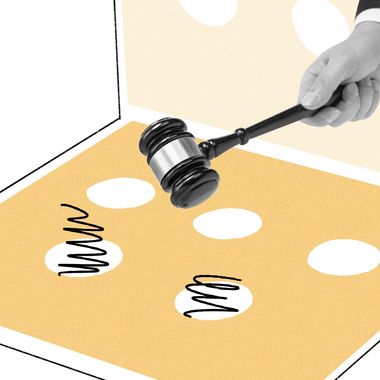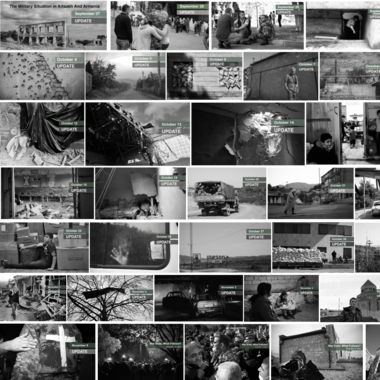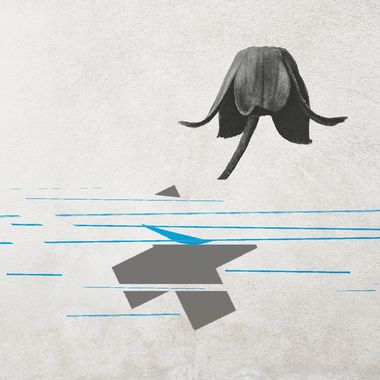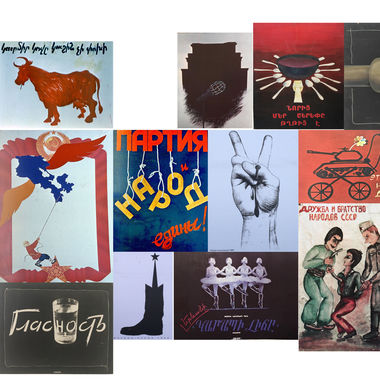Wed Sep 29 2021 · 5 min read
What Is France Looking for in the Nagorno-Karabakh Issue?
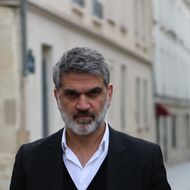
By Gaïdz Minassian
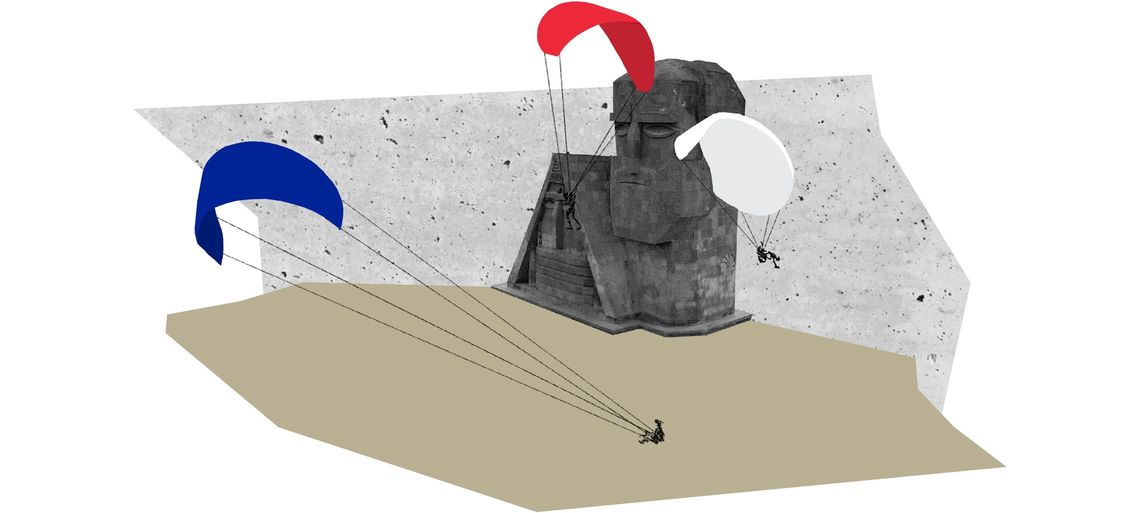
Illustration by Armine Shahbazyan.
Since the 44-day war, France has been at the forefront of diplomatic activity in resolving the Nagorno-Karabakh conflict. Not a week goes by without President Emmanuel Macron, his Minister of Foreign Affairs, Jean-Yves Le Drian, the former French Ambassador to Armenia, Jonathan Lacôte or even the French co-chair of the OSCE Minsk Group, Stéphane Visconti, speaking on this issue. How is this renewed diplomatic activity of France to be explained? And what goal is Paris hoping to achieve with this issue that is so far removed from the concerns of the French?
The most skeptical will say that France is no more Armenophile than Armenia's traditional partners. On the other hand, the most enthusiastic will say that, since the commencement of hostilities in the fall of 2020, France has shown unprecedented solidarity towards Armenia. President Macron was the only head of state to denounce Azerbaijan's aggression and Turkey's involvement in this conflict, insisting on Ankara's use of jihadist mercenaries transferred from Syria to the South Caucasus via Gaziantep. France was the first power to provide substantial humanitarian aid to civilian populations affected by the conflict. And finally, France was the first to demand that the sides return to the negotiating table within the framework of the Minsk Group. To which the most skeptical would respond: France has, through the voice of its sinister and cynical head of diplomacy, Jean-Yves Le Drian called for "neutrality" in this conflict while the aggressor has been designated and in time of war, neutrality no longer exists, except to resume the cowardly rhetoric of France’s Popular Front government at the outbreak of the war in Spain in 1936. France has since launched negotiations with Azerbaijan on the reconstruction of areas formerly under Armenian control.
All of this is true and there is nothing surprising about having two irons in the fire. This search for balance characterizes French diplomacy; a diplomacy of mediation seeking to share with the opposing camps a sense of fairness and responsibility, while British diplomacy is, for example, more a diplomacy of tension, where London chooses one camp over another.
But then why this avalanche of declarations from Paris in this “NK” [Nagorno-Karabakh] file as the diplomats of the Quai d'Orsay call it, in total rupture with the silence of the French co-chairs who have succeeded one another within the Minsk Group without the slightest interview, or the slightest interview for nearly ten years?! The only one who liked to speak was the late Ambassador Bernard Fassier and again it was more to correct the approximations of his colleague and American Turkophile, the chatty Matthew Bryza than to insist on France's investment in this thorny issue.
This resurgence of activity is all the more sudden in view of the declarations of French diplomats on the strategic involvement of Paris in the resolution of this conflict or on a possible visit of Emmanuel Macron to Yerevan or even on a recognition of the independence of the Republic of Artsakh in the wave of resolutions passed in this regard by the two chambers of Parliament; Armenian public opinion and media really believed that the West was going to intervene in their favor. They believed that French troops were going to land in the streets of Yerevan, that French military equipment was going to be delivered to the Karabakh front… Calm down, never, at any time did France consider supporting Armenia with military assistance. Never.
So what is going on in the minds of French diplomats to arouse so much hope on the Armenian side? Four essential elements explain this overexposure of the Armenian question in the official communication from Paris.
First of all, France has not digested the tripartite declaration of November 9, 2020, which ended the 44-day war. Since this Russian-Turkish initiative, both Paris and Washington have felt humiliated by this sidelining. And as this has still not passed, the two Western co-chairs of the Minsk Group are redoubling their efforts to reactivate what remains of this body. Secondly, in the long term, through this diplomatic activity France wants to reaffirm its power in Europe. Paris, as a state endowed with nuclear deterrence, has the ambition to establish its diplomacy on a world scale. Legitimized by its function as a co-chair of the Minsk Group, France intends to demonstrate its power in this pivotal region of Europe. Thirdly, as a permanent member of the Security Council, France intends, through this engagement in the “NK” file, to strengthen peace and stability in the South Caucasus, and thus bring a perspective of harmonization of public policies and of going beyond nationalism. Finally, and this is the backdrop to global diplomatic activity in the region, France is investing in this issue because it is thinking above all of the opening up of Iran through the South Caucasus, and mainly by putting in place the North-South corridor that would run from Iran to Armenia and then Georgia. This would make it possible to bypass both Russia and Turkey but also to consolidate a Western presence in the region, even if it is necessary first to relaunch the Joint Comprehensive Plan of Action (JCPOA) with Iran, which mainly depends on the goodwill of Washington and Tehran.
This is why Paris is re-engaging in the South Caucasus and wants to reactivate the Minsk Group. But that doesn't mean helping Armenia at all costs. According to a classic realistic approach to international relations, the interest of France intersects with the interest of Armenia in this first phase of the resolution of the Nagorno-Karabakh conflict. Paris wants to relaunch the Minsk Group to reassert its power and interests, not to satisfy Armenia on principle. After relaunching the Minsk Group - and the last UN General Assembly in New York seems to have been decisive in this direction - nothing indicates that the interests of Paris and Yerevan remain convergent: Will Paris be satisfied with a diminished status for Artsakh? Will Yerevan just accept the principle of relaunching the Minsk Group without going any further so as not to upset Russia? Will Paris and Washington walk hand-in-hand on this issue as the submarine affair (with Australia) has cast a shadow on their bilateral relationship? Through the voice of its ambassador to Armenia, Washington insists on the three major principles of the resolution of the Artsakh conflict, including the right to self-determination. Does Paris agree? It would seem that France's strategy is once again faithful to its tradition of mediation, the avatar of which is the “at the same time” technique dear to President Macron: relaunching the Minsk Group with Washington and ensuring the right to the self-determination of Artsakh while advancing jointly with Russia within the framework of a UN draft resolution with a view to finding a mechanism for stabilizing the peace (international observation mission with Russia as the framework nation). This is a skill full of nuances and balance, of course, except that, until now, the technique of "at the same time" has been a diplomatic fiasco.
New on EVN Report
Armenia and Azerbaijan Take Fight to ICJ
By Gabriel Armas-Cardona Esq.
Armenia instituted proceedings against Azerbaijan at the International Court of Justice on the basis of violations of the Convention on Elimination of Racial Discrimination. A week later, Azerbaijan submitted its own claim against Armenia. Gabriel Armas-Cardona breaks it down.
A Chronology of the 44 Days of War
Today, September 27, marks the one year anniversary of the start of the 2020 Artsakh War. Here is a chronology of the 44 days of war and beyond that we published last year.
The Guardian Women of the Front Lines
By Kushane Chobanyan
While the majority of women didn’t pick up guns to fight in the war, many used their skills to fight in their own way. On this first anniversary of the 2020 Artsakh War, Kushane Chobanyan presents the stories of six extraordinary women who were on the front lines.
Breaking the Immunity of Dictators
By Irina Ghaplanyan
Dictators are emboldened by the silence of those who claim to be proponents of human rights and justice. Turkey’s Erdogan and Azerbaijan’s Aliyev must be held accountable for war crimes and crimes against humanity, writes Irina Ghaplanyan.

